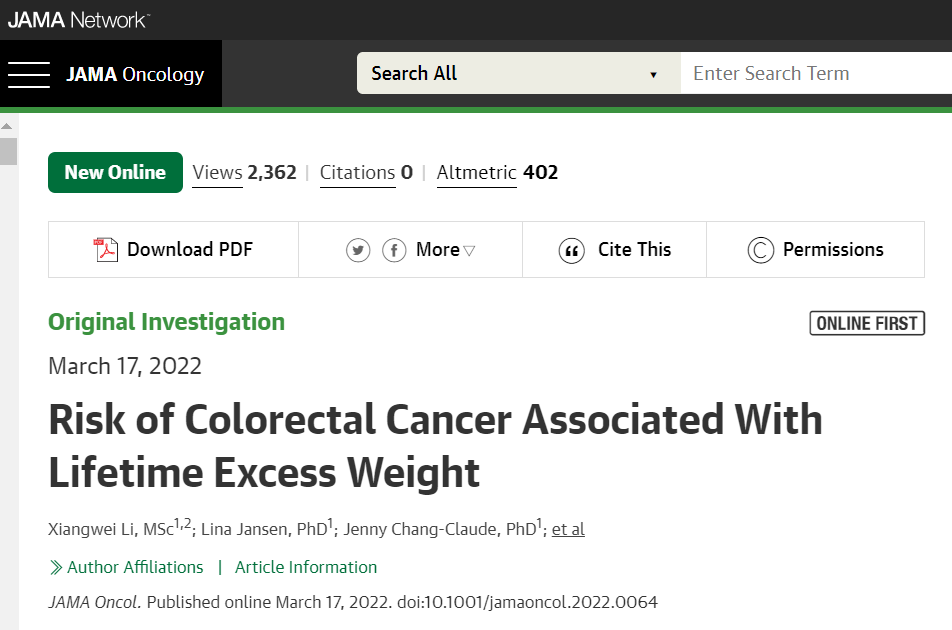▎ WuXi AppTec content team editor
According to the World Health Organization, at least 300 million adults worldwide are obese and 1.4 billion are overweight. Being overweight is one of the risk factors for colorectal cancer (CRC), and there have been many previous studies evaluating the association between colorectal cancer and being overweight over a certain period of time.
So what is the link between being overweight and colorectal cancer risk throughout the life cycle?
A recent study published in jama oncology, the American Medical Association, found that the longer you are overweight, the higher the risk of colorectal cancer.

Screenshot source: JAMA Oncology
The case-control study included a total of 5635 colorectal cancer patients and 4515 controls without cancer, with an average age of 68.4 years. The researchers obtained weight and height data for these participants from age 20 to their current age, recorded every 10 years. Based on height and weight, the researchers calculated the participants' body mass index (BMI) and classified them according to The World Health Organization's criteria:
Underweight: BMI2;
Normal weight: BMI between 18.5kg/m2 and 25.0kg/m2;
Overweight: BMI between 25.0kg/m2 and 30.0kg/m2;
Obesity: BMI≥30.0kg/m2.
The investigators comprehensively assessed and compared the overweight and obesity rates of all participants at different ages and derived a weighted number of years of overweight or obesity (WYO, defined as bMI excess values× years, BMI >25 as excess) to reflect their cumulative lifetime exposure to overweight. On a baseline, through multiple logistic regression, the association between BMI and colorectal cancer risk was investigated among all participants every ten years (e.g., 20, 30, and 40 years old) and approximately 10 years before the study (at ages 5 to 14 years).
After adjusting for factors such as age, sex, education level, smoking status, alcohol consumption, physical activity, family history of colorectal cancer (history of first-degree relatives), previous colonoscopy findings, use of NSAIDs (defined as ≥ used or currently used 2 times a week for >1 year), and use of statins (defined as current routine use of statins ≥ 1 time/week for > 1 year), the researchers observed:
In both colorectal cancer patients and control groups, the average BMI increased with age and reached its maximum at age 70. Colorectal cancer patients had a significantly higher BMI per 10 years compared to the control group, for example, at age 50, the control group population was 25.8 kg/m2, compared with 26.6 kg/m2 for colorectal cancer patients. Similarly, at each age, the prevalence of overweight and obesity was significantly higher in patients than in the control group, for example, at age 50, the prevalence of overweight was 45.7% and 43.3%, and the obesity rate was 17.1% and 11.4%, respectively.
There was an association between BMI and colorectal cancer risk in different populations over a 10-year period. At ages 20 and 30, for every 1 standard deviation increase in BMI, the risk of colorectal cancer increases by 19% (OR=1.19).
There is also an association between lifetime overweight exposure (WYO) and colorectal cancer risk. Compared to people who have always maintained a normal weight, WYO was divided into 4 groups from less to more, and the risk of colorectal cancer ranged from 25% to 154%. Each additional standard deviation from WYO was associated with a 55% increased risk of colorectal cancer (OR=1.55). That is, the more overweight you accumulate in a lifetime, the higher your risk of colorectal cancer.
Image credit: 123RF
The paper notes that the findings suggest that the longer you are overweight, the greater the risk of colorectal cancer. This may be more helpful in fully revealing the relationship between being overweight and colorectal cancer and other cancers and diseases than previously focused on weight at a certain point in time. Preventing and reducing (reversing) the prevalence of overweight and obesity has the potential to prevent most colorectal cancers, as well as other obesity-related cancers.